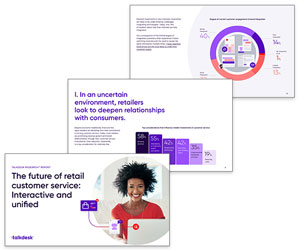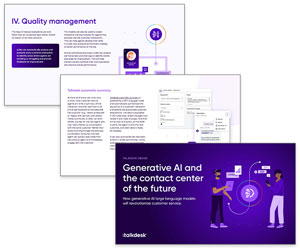Alex Loach looks at the perennial problem of whether you should outsource customer service.
As with many things, I don’t think that there is a set answer to whether you should outsource your customer service as it depends on so many different scenarios.
You should never outsource any of your key competencies
What I will say, however, is that you should never outsource any of your key competencies, and if the service you provide is part of your key competency than you must leave it alone or you are fundamentally sending the heart of your business away. However, that doesn’t mean that outsourcing your service function cannot help you develop a more customer-centric approach.
Dealing with peak volumes
Assuming this is not the case, though, a place where outsourcing can be extremely beneficial is when the volumes are far from steady. If for three-quarters of the year you need 30 members of staff on the phone, but then for the final quarter you need 100, then this is the type of model where outsourcing could become increasingly beneficial.
Whilst there is often quite a lot of bad press regarding outsourcing of service and support functions (as there will always be the lingering question of how they can provide a better service to your customers than you can), it also has to be remembered that because outsourcers have often worked with a wide range of services, it could be that they have access to options or technology that you do not.
Don’t outsource as a cost-saving exercise
It is important to remember that if you are going to outsource a service or support function, it must be to allow you to improve that function. Whilst this may not be true for other business areas, service functions should not be outsourced purely as a cost-saving exercise, and it should never be done just because you can not deal with a problem. If you try and outsource a service function because you can’t solve something, it will grow and grow until that problem has grown out of all proportion. Don’t just shift it, fix it, then move it in order to improve.
Now the hard work begins
Once the process of outsourcing has occurred, the hard work begins, because now you have to manage, monitor and improve a function that you do not fully control. This is where you have to work hand in hand with the outsourcing company to create a relationship for improvement that needs constant reviewing, with each review having specific objectives for improvement, and each with the necessary attendees to make it happen.
Again, it is about leveraging the extra value of the relationship. For example, an outsourcer may be purchasing a specific piece of technology for use by one of their other partners. This may therefore be something that you have not been able to purchase operationally, or are simply unwilling to. However, the outsourcer may be happy for you to use that technology as an added benefit of the relationship.
Building the relationship
The stronger the relationship you have with your outsourcer, the higher the chance of you getting the most out of it. Remember, though, strong, long-term relationships are rarely created between two businesses, but between two, four or six people within them. It is then up to those individuals to be open and honest with each other from the start.
This will maximise the relationship and quickly solve issues or work towards new benefits as you go along, and this is when you stop thinking of them as a separate organisation, but as a different arm of the same company. At this point, treat them this way. Communicate as often as you do internally and in the same way. If your other departments need to know something, the chances are the outsourcer does too. If the other departments have strict metrics and performance reviews, then so should your outsourcer.

Alex Loach
You need each other, and for it to work for your customers, and for you to truly have a customer-centric approach in place, your consumers need you both working together.
Alex Loach is Head of Customer Services at Serif (Europe) Ltd
Author: Jo Robinson
Published On: 19th Jun 2013 - Last modified: 7th Jul 2022
Read more about - Customer Service Strategy, Business Process Outsourcing (BPO), Customer Service








































Good article Alex. The cost saving argument is contentious however as it is at the heart of some of the biggest outsourcing deals eg Shop Direct/Serco, O2/Capita, Barclaycard/Firstsource.
In outsourcing situations there are 3 main business reasons:
1) The structural change required to the business’ operating model is more quickly achieved
2) Fewer people and facilities are needed as businesses remove unnecessary customer effort and outsourcers provide wider employment
3) Outsourcing the risk & technology investment on further reductions in customer effort because in outsourcers have technology platforms and, in some cases, deeper and wider management.
The cost saving on arbitraging labour rates is incidental and small compared to the above business challenges.
Good article!
I agree that not outsourcing your core business is a sensible thing to do (or why would you be doing it in the first place?), but slightly disagree on your second point.
Perhaps the service provider you choose can actually provide a *better* level of customer service because you’ve chosen them for that very reason?
Great article Alex!
Its so true not to outsource for just saving cost. But at the same time if outsourcing is done methodically can not only maintain customer satisfaction but achieve customer delight.
Hi Alex! Your article is very good. I agree with your discussion and I think that the first tip you gave should really be practiced by all companies that will consider outsourcing their customer service. One’s key competencies should be done in-house since those are the things they should really be focused on while setting aside other supporting tasks and delegating it to an outsourcing company. On the other hand, since customer services is one of the most crucial aspect of any business, it should be outsourced to an outsourcing company that has been in the field for a long time and is already credible and trustworthy.
Hi Alex,
Really enjoyed your article. It’s refreshing to see an article with focus on building a relationship with an outsourcing vendor. Too many businesses choose a vendor based purely on price, rather than the experience, credentials, etc. This is where all too often outsourcing can go wrong, choosing the wrong provider for the wrong reasons.
Mel
CallCare
Such an interesting post Alex. This post brief me the entire methodology and structure of outsourcing.
I absolutely agree that you should never outsource your core competency. Outsourcing should be a way to alleviate workload and allow you to focus more on your core competencies. Outsourcing has had a bad rap over the years, and mostly well deserved. But, there are some great companies around now that offer some slick packages to help smaller companies and start-ups. Just make sure its a partnership. If they do their job right, your customers should never even know they are dealing with an outsourcing company. Whoever you choose, should also have an open dialog with you at all times. Its should be a partnership, not a set it and forget it approach.
For me ownership is irrelevant – you should be able to offer a consistent experience whether inhouse or outsource and whether core competency or non core.
The only relevant variables are a clear and engaging vision and strong, inspiring and consistent leadership.
People are people, they only behave differently if they are led differently.